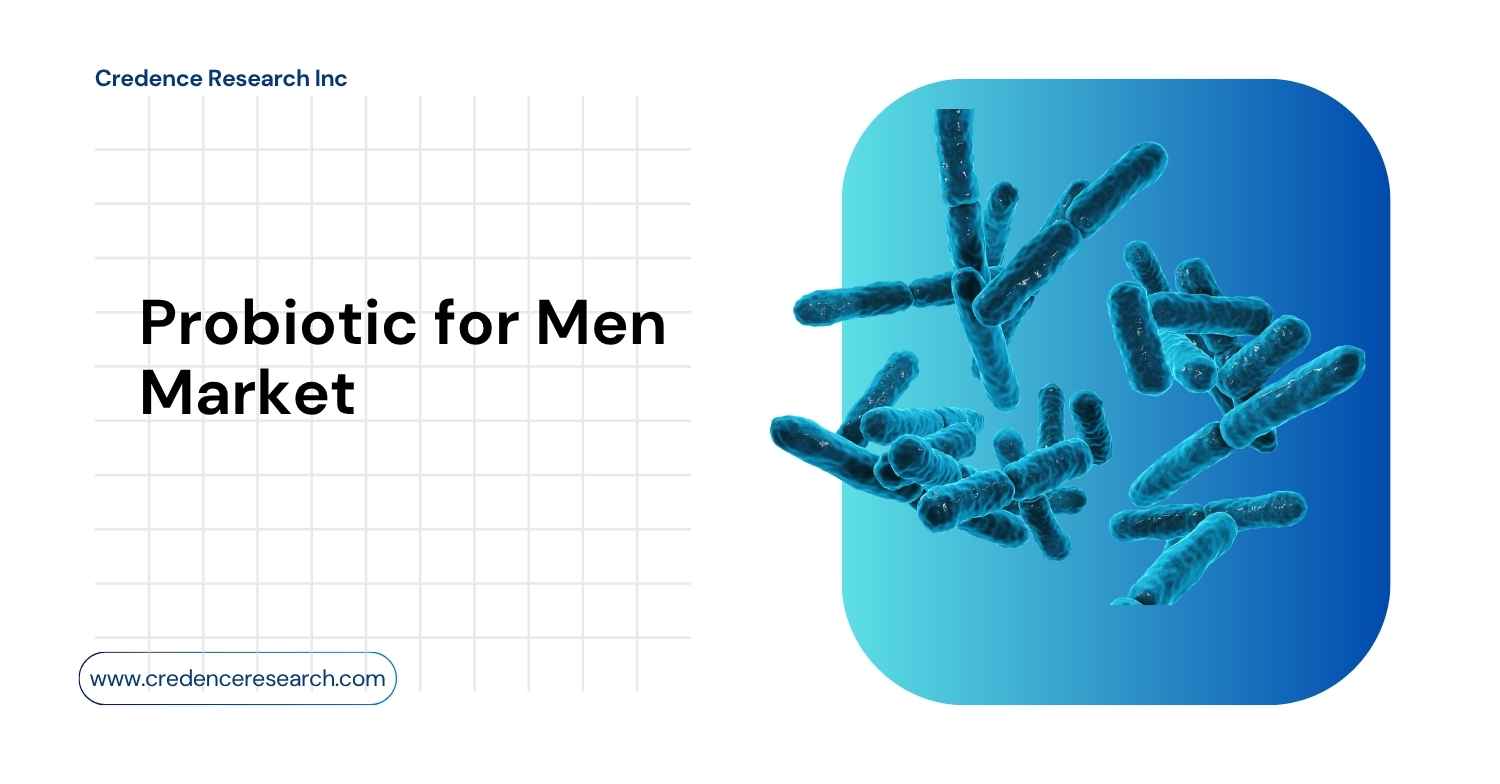According to Credence Research’s the latest report titled “Global Probiotic for Men Market – Growth, Share, Opportunities & Competitive Analysis, 2024–2032.” The global probiotic for men market is expected to grow from USD 2,380.50 million in 2023 to USD 4,341.28 million by 2032, registering a compound annual growth rate (CAGR) of 7.8% during the forecast period from 2024 to 2032.
Probiotics for men are gaining traction as consumer focus shifts toward preventive health. These products help support digestive balance, immune response, mental well-being, and urogenital health. Product formats include powders, gummies, liquids, tablets, and drops, each designed to match diverse consumer preferences.
Rising Focus on Digestive Health and Lifestyle Wellness Among Men
A major driver in the probiotics for men market is the rising emphasis on digestive health and functional wellness. In the United States alone, around 35.4 million physician visits and 8.8 million emergency cases each year are linked to digestive disorders, with 60 to 70 million people affected overall. Poor diets, inactive lifestyles, and chronic stress contribute to gut imbalance, fueling interest in supplements that restore microbiome health. Controlled trials in male athletes show that daily probiotic use at 1 × 10⁹ CFU over 11 weeks reduces gastrointestinal distress and illness severity during high training periods.
Probiotics also aid nutrient absorption, metabolic regulation, and immunity. Products designed for men include precise strain counts, such as one billion CFU at manufacture and 1 × 10⁷ CFU at shelf life for single-strain digestive capsules. Studies show that probiotics lower respiratory illness frequency and reduce medication use during intensive exercise. Multi-strain blends delivering up to 20 billion CFU per capsule are gaining popularity in fitness and recovery products aimed at supporting digestive and immune function under physical stress.
The gut-brain axis is another growing focus. Digestive balance influences hormonal regulation, stress response, and cognitive health. In controlled trials, men consuming Lactobacillus casei Shirota daily for eight weeks reported fewer stress-related abdominal issues and preserved microbial diversity. Other studies found reduced salivary cortisol and lower stress ratings when probiotic fermented milk was consumed under acute stress conditions. This evidence is driving interest in mood-enhancing probiotic strains that support resilience and sustained daily functioning during demanding periods.
An aging male population further expands market potential. The United States added about 1.6 million adults aged 65 and older between 2021 and 2022, many seeking non-invasive digestive and immune support. Age-related gut microbiome changes heighten vulnerability to gastrointestinal and metabolic issues. Clinical studies show probiotics can reduce inflammatory markers such as high-sensitivity C-reactive protein by 1.05 mg/L and increase plasma deconjugated bile acids by 1.00 nmol/L over nine weeks compared with placebo.
Manufacturers are meeting this demand through advanced, men-focused formulations. These include daily blends delivering 50 billion CFU with 15 probiotic strains and added nutrients like 500 mg cranberry extract and 1,000 IU vitamin D3 for urinary and prostate health. Such innovations reflect the growing integration of probiotic science into men’s preventive wellness, linking gut health, immunity, and overall vitality.
Browse market data figures spread through 220+ pages and an in-depth TOC on “Probiotic for Men Market”
Increased Demand for Functional Gummies and Strain-Enhanced Formulations
A key trend in the probiotic for men market is the rise of gummies and functional delivery systems. Gummies have become a preferred format due to their ease of use, taste, and shelf stability. As capsules and powders often require refrigeration or water intake, gummies provide on-the-go convenience for active consumers.
Brands are using advanced encapsulation and stabilization methods to ensure probiotic viability in non-refrigerated formats. Multi-strain gummies with added prebiotics, vitamins, or adaptogens are gaining traction. These combinations target immunity, energy, digestive support, and stress reduction in a single product.
Men-specific gummies are being formulated with clinically studied strains such as Lactobacillus rhamnosus, Bifidobacterium lactis, and Saccharomyces boulardii. These strains are selected for benefits like improved digestion, reduced inflammation, and toxin elimination. Products that claim fast-acting effects or dual functionality are more likely to attract repeat purchases.
Retailers and direct-to-consumer platforms are showcasing gummies as entry-level products for men unfamiliar with probiotic supplementation. Product labeling often emphasizes visible outcomes like bloating relief or energy improvement within days. This messaging aligns with lifestyle marketing focused on fitness, productivity, and long-term health maintenance.
The trend is further supported by clean-label preferences. Men are increasingly choosing non-GMO, sugar-free, and gluten-free formulations. Brands are also responding to demand for vegan options and allergen-free ingredients. As the gummy market evolves, manufacturers are expected to invest more in high-strain-count offerings and targeted blend development.
Lack of Product Awareness and Strain-Specific Education Among Male Consumers
Despite strong growth potential, the probiotic for men market faces a challenge in the form of limited consumer understanding. Many men remain unaware of the role probiotics play in digestive health, hormone balance, and immune function. When compared to women’s health products, the marketing and education focus for men is still underdeveloped.
Strain specificity is another barrier. Consumers often do not understand that different strains yield different effects. This lack of clarity results in poor strain selection, inconsistent results, and reduced brand loyalty. As a result, some users abandon probiotics after short trial periods due to unmet expectations.
The complexity of probiotic labels, dosage schedules, and required storage conditions adds further confusion. Brands that do not clearly communicate expected benefits or usage guidance may struggle to build trust with male audiences. In addition, exaggerated health claims from some manufacturers have led to skepticism, making new customer acquisition difficult.
In many regional markets, cultural norms also limit supplement adoption among men. In parts of Asia, Latin America, and the Middle East, wellness products are still perceived as female-oriented. Market penetration is limited unless brands localize education and offer male-centric branding.
Overcoming these challenges will require sustained investment in product transparency, educational outreach, and targeted marketing. Clear messaging, third-party certifications, and clinical study references can support user confidence and market expansion.
Market Segmentation
By Product
- Liquid Drops
- Powder
- Ready-to-Feed Liquids
- Chewable Tablets
- Gummies
By Sales Channel
- Hypermarket/Supermarket
- Specialty Stores
- E-Commerce
- Drug Stores & Pharmacies
- Health & Wellness Stores
- Convenience Store
- Departmental Stores
- Mass Grocery Retailers
By Strain Type
- Lactobacillus
- Streptococcus
- Bifidobacterium
- Propionibacteria
- Enterobacteria
- Saccharomyces
By Region
North America
- U.S.
- Canada
- Mexico
Europe
- Germany
- France
- U.K.
- Italy
- Spain
- Rest of Europe
Asia Pacific
- China
- Japan
- India
- South Korea
- South-east Asia
- Rest of Asia Pacific
Latin America
- Brazil
- Argentina
- Rest of Latin America
Middle East & Africa
- GCC Countries
- South Africa
- Rest of the Middle East and Africa
Key Player Analysis
The market is moderately consolidated, with major players investing in new strain development, regional expansion, and male-specific branding. Companies are focusing on high-survivability probiotics, clean-label ingredients, and customized blends. Marketing strategies emphasize fitness, vitality, and gut performance.
- Nestlé
- Bayer
- Unilever
- Procter & Gamble (P&G)
- NOW Health Group
- Amerifit Brands
- Reckitt
- The Clorox Company
- Solimo
- Physician’s Choice
- Jiangzhong Pharma
- WonderLab
- Kyung Nam Pharm
- CKD LACTO-FIT
- Morishita Jintan
- Suntory
These players are advancing R&D in strain efficacy and formulation technology. Partnerships with clinical institutions are being used to validate health claims. E-commerce and direct-to-consumer platforms remain key growth channels, especially in North America and Asia Pacific.
About Us:
Credence Research is a viable intelligence and market research platform that provides quantitative B2B research to more than 2000 clients worldwide and is built on the Give principle. The company is a market research and consulting firm serving governments, non-legislative associations, non-profit organizations, and various organizations worldwide. We help our clients improve their execution in a lasting way and understand their most imperative objectives.
Contact Us
Credence Research Europe LTD
128 City Road, London,
EC1V 2NX, UNITED KINGDOM
Europe – +44 7809 866 263
North America – +1 304 308 1216
Australia – +61 4192 46279
Asia Pacific – +81 5050 50 9250
+64 22 017 0275
India – +91 6232 49 3207











